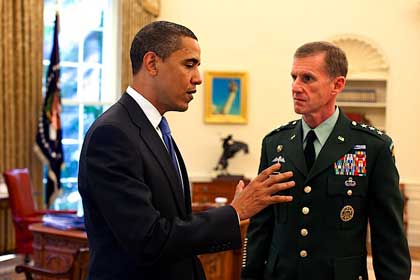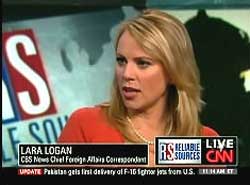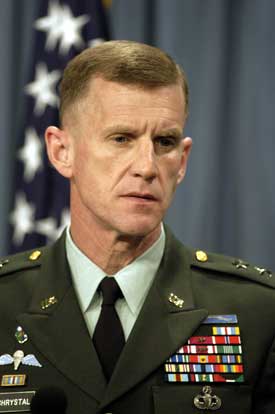GUEST BLOG #100: TVWW Welcomes Its Newest Contributor, Eric Mink, Who Assesses the Media Flap Over the McChrystal Story
[Bianculli here: Just in time for the relaunch, we're proudly adding yet another co-conspirator to TV WORTH WATCHING: Eric Mink, whom long-time New York Daily News readers will remember was my co-conspirator, and fellow TV critic, there as well. And for his first story for us, Eric offers his take on the reporting of, and reaction to, the Gen. Stanley McChrystal remarks...]

Rolling Stone reporter Matt Taibbi -- never one to mince words, thank god -- unloaded on CBS News' Lara Logan in a Monday blog post headlined, a tad indelicately, "Lara Logan, You Suck."
Actually, Logan already had established that fact pretty conclusively herself in an embarrassing interview televised Sunday on CNN's Reliable Sources, but I guess Taibbi wanted to make sure no one missed the point.
What infuriated Taibbi most, he wrote, was Logan's thinly disguised accusation that freelance writer Michael Hastings has been lying about the tactics he used in reporting his stunning piece for Rolling Stone on Army Gen. Stanley McChrystal. McChrystal had been the commander of U.S. and NATO forces in Afghanistan until last week when President Obama relieved him of duty for insubordination plainly revealed in comments by McChrystal and senior members of his staff in Hastings' story.

Logan told Reliable Sources host Howard Kurtz, "Michael Hastings, if you believe him, says that there were no ground rules laid out. And, I mean, that just doesn't really make a lot of sense to me... I mean, I know these people. They never let their guard down like that... I just -- I don't believe it." (See the video HERE.)
Tabbi laid into the we're-all-friends, beat-reporting approach that Logan seemed to endorse, and then lumped her in with the prototypical "would-be 'reputable' journalist who's just been severely ass-whipped by a relative no-name freelancer on an enormous story [and who] fights back by going on television and, without any evidence at all, accusing the guy who beat him of cheating."
Vitriol aside, Taibbi's best point, I think, is the sad truth that far too many journalists -- mainstream AND non-mainstream, by the way -- forget who we're supposed to be reporting and writing for. It's not for our editors. It's not for our publishers or advertisers. It's not for other journalists. And it's certainly not for the -- choose as many as you want -- politicians, administrative staffers, athletes, team managers, funders, business executives, club owners, civilian officials, campaign strategists or the military commanders and their suck-up staffs we're covering.
It really doesn't matter whether we're on the international terrorism beat or the television beat. We report, research, analyze, assess and write for our readers, listeners and viewers -- people who, for an infinite number of reasons, can't do it for themselves. They DO, however, want to know about things, and they are willing to grant us the most valuable thing they have -- a slice of their extremely limited time -- in exchange for honest, skilled, professional work that gives them information of value.
Logan is hardly alone in not having a clue about this (and not realizing that she doesn't), nor is Taibbi alone among reporters in getting it, whether in print, broadcast, cable or Internet. But Hastings' story on McChrystal has cast the whole matter in high relief.
I've never been all that wild about the explanation that this is about access, that beat reporters play nice so that when real news develops, they'll be assured of hot information, good quotes and great guest bookings. Yeah, there's some of that, but Taibbi's blog post, again, gets at something deeper and more
primal and, therefore, more disturbing.

Reporters try to please the people they're covering, Taibbi wrote, "because you just want to be part of the club so so badly... Most of these reporters just want to be inside the ropeline so badly -- they want to be able to say they had that beer with Hillary Clinton in a bowling alley in Scranton or whatever -- that it colors their whole worldview."
It is a dangerous delusion. Jerry Berger, a long-time newspaper gossip columnist in St. Louis, advised me about this very early in my career. He said that a lot of reporters -- particularly those who deal with prominent people -- can be seduced by their proximity to wealth, power and fame, and come to believe that it's their world, too. They think that they're "part of the club," as Taibbi put it.
"We will never be part of their world," Berger warned me. "They will let us think we are, but only as long as they see us as useful to them somehow. Don't ever forget that."
Michael Hastings could have omitted the damning things he included in his piece on McChrystal & Co. in Afghanistan. I'd bet money, in fact, that he did leave out a lot of what some of his critics have dismissed as workplace banter and the universal practice of employees kvetching about their bosses.
But Hastings, like all reporters, had to make judgments about his material, about what he could leave out because it wasn't really important and what he had to include because it was. In making those judgments, context mattered.

Hastings knew, for example, that a confidential report on Afghanistan that McChrystal had written for Defense Secretary Robert Gates last August 30 had been leaked to the Washington Post's Bob Woodward and published on Sept. 21. The source of the leak remains unknown, but the report itself bolstered arguments in favor of the strategy McChrystal favored in Afghanistan, and it leaked at the precise time that the Obama administration was considering which policy options to adopt.
Hastings also knew that last October 1, with the administration still mulling its options, McChrystal made a public speech and answered questions at the International Institute for Strategic Studies in London in which he endorsed certain policies and criticized others. A day later, McChrystal was ordered to fly to Copenhagen, where he received a private rebuke from the president aboard Air Force One on an airport
runway.
With that as background, what Hastings encountered in Afghanistan was top aides to McChrystal who were willing to ridicule senior administration officials and do so in McChrystal's presence. He saw McChrystal let them do so with impunity and, in a couple of instances, saw the general make his own disparaging comments.
At that point, Hastings had only two choices: Cover up yet another instance of a wartime general and his staff demeaning their civilian superiors, or provide readers with an honest report of a story of major significance.
We know what Hastings did. And, I guess, we know what Lara Logan's choice would have been.
--

Eric Mink most recently was the Op-Ed editor and columnist for the St. Louis Post-Dispatch. He previously wrote about television and media for the Post-Dispatch and the New York Daily News. He now teaches film as an adjunct assistant professor at Webster University in St. Louis.